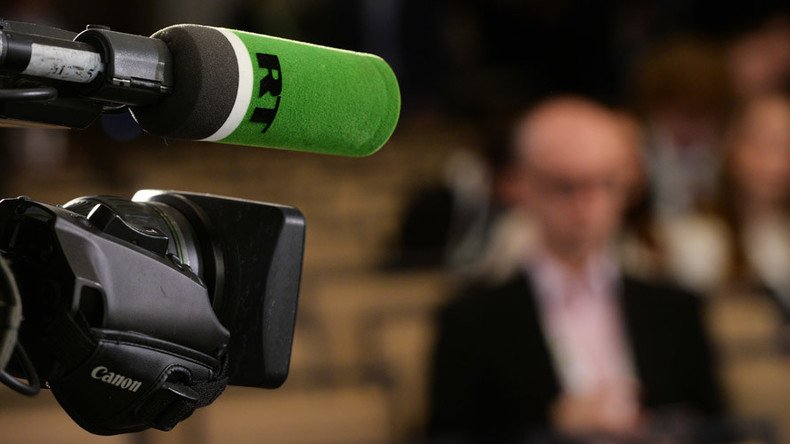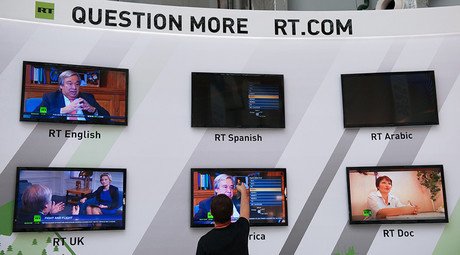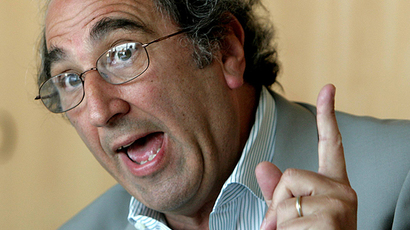US media agency BBG chief says more taxpayer money needed ‘to counter RT’

BBG, the US government agency overseeing state-funded media directed at foreign audiences, needs more money to be on a par with countries such as Russia and China, its head says as radical reform looms in Congress.
“There’s no question we’re badly underfunded and don’t have enough money to compete with our adversaries,” Jeff Shell, chairman of the Broadcasting Board of Governors (BGG), told the Washington Times.
BGG oversees outlets such as Radio Free Europe/Radio Liberty, Voice of America Radio Free Asia and the Middle East Broadcasting Networks, which try to appeal to foreign citizens with pro-American programming. According to Shell, the US is “spending a small fraction of what our adversaries are spending” - those being Russia's RT, China's CCTV and Qatar's Al Jazeera.
"We have three great challenges right now," Shell told the Washington Times. "The challenge of this newly nationalistic Russian media, the challenge of China presented increasingly through cybertechnology and, finally, the challenge of violent Islamic extremists spreading their propaganda online.”
American taxpayers fund BBG's operations to the tune of roughly $730 million a year. The Times says this is higher than Moscow spends on RT, estimated at roughly $307 million annually. Indeed, the Russian government allocated just over $300 million to the channel in the 2016 federal budget.
The Washington Times says the BBG is concerned about its engagement model, while RT is taking the lead in the “new media” with three billion views across its YouTube channels, which made it the world's top TV news network on the platform.
"The reality is, if you're trying to reach a 12-year-old or other younger people, they're not listening to radio in their cars. They have an iPhone or other device, and that's what they're listening to," Shell told the newspaper.
"We have to make both regional and technological choices. We'd love to be on FM and on TV and all over the world, but we've decided in some countries that it's more important to reach young people in the digital realm,” he added.
Shell's plea for more resources comes as some US legislators are calling for an overhaul of the American approach “to deliver the government’s message.” Critics say the BBG suffers from a lack of focus and rampant bureaucracy. Last summer, Rep. Edward R. Royce, the Republican chairman of the House Foreign Affairs Committee, and Rep. Eliot L. Engel, the ranking Democrat on the committee, introduced legislation that would reform the agency.
READ MORE: House panel urges US to fight Russia's ‘weaponized information’
The reform is designed to reduce duplication of its services, establish a full-time day-to-day leader of the agency, currently run through monthly board meetings, establish a new separate organization called the Freedom News Network, and launch an international communications agency under the BBG.
Shell told the newspaper he supported the reduction of redundancy, which is what the BBG is trying to achieve with ongoing internal reform, but doubted the idea of creating the new agency with its own board.
“I agree with reform to eliminate bureaucracy so you can have more money to spend on content, and to eliminate duplication so you’re not doing the same things in different ways,” he said. “But to me, two boards and two bureaucracies and two CEOs will result in exactly the opposite of those goals.”
His sentiments are echoed by others at the BBG.
“So you will have created two media organizations, with two boards and no single oversight of both,” said board spokeswoman Laurie Moy. “At a time when Russia and China and others are centralizing their media efforts, this bill would split us up, and that would actually make it harder to achieve this more focused mission that the legislation claims to intend.”
The BBG is concerned that the bill would result in the board being defunded, the Times said citing an anonymous source.
The BBG earlier attacked RT, when its newly appointed CEO Andy Lack put the Russian news network on the same challenge list as Islamic State and Boko Haram, the notorious terrorist groups. Lack resigned after just six weeks in office.
Criticism about the American government's failure to compete with alternative points of view coming from countries such as Russia and China were previously voiced by top US officials and politicians. Secretary of State John Kerry cited RT's growing influence last year to explain to lawmakers why his department should be allocated more money.














